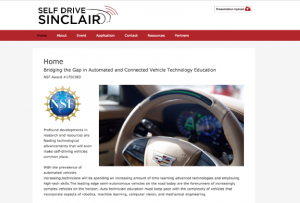Bridging the Gap in Automated and Connected Vehicle Technology Education

Profound developments in research and resources are feeding technological advancements that will soon make self-driving vehicles commonplace. Today's leading-edge, semi-autonomous connected vehicles utilize technology that includes radars, cameras, lidar, multi-domain controllers, wireless vehicle-to-vehicle communications, and software applications, to name a few. The proposed postsecondary faculty professional development project, focused on automated and connected vehicle technology, will serve the NSF's mission of promoting the progress of science by creating industry-supported workshops and college-level educational resources to academically strengthen postsecondary automotive technician degree programs. Project activities such as summer institutes and professional development webinars for faculty will be designed to advance the field of vehicle technology education across the country by informing the educators of future technicians about the new generation of vehicles that are radically changing the automotive and transportation industries. In addition to professional development, the autonomous vehicles and other materials purchased through the grant will also be used to provide outreach activities in secondary schools, including creating a toolkit comprised of interactive demonstrations designed to orient secondary school students, teachers, and counselors to automotive technician educational pathways and careers.
Auto technician education must keep pace with the complexity of vehicles that incorporate aspects of robotics, machine learning, computer vision, and mechanical engineering. The goal of the proposed project is to increase the autonomous vehicle technology experience and knowledge of automotive technology educators throughout the nation and address the growing need for qualified, knowledgeable technicians with capacity to maintain and repair autonomous vehicles. The project will provide a week-long professional development session, webinars, and other learning events for 40 community college faculty annually. The project will also conduct outreach activities in secondary schools to impart information about the high wage, high-tech nature of the work of automotive technicians, important since many secondary school students skilled in science, math, and technology are not choosing automotive technician careers due in part to their misconceptions about what the work entails. The project will also monitor and document the skills and knowledge needed by the future automotive technician who will repair and maintain vehicles using a new set of skills not taught today. The project outcomes will be useful to other institutions with automotive technician education programs that need to update their curriculum to meet the changing needs in the industry or are struggling to diversify their student population interested in automotive technology careers.

Comments